Posted inQuestion about Japan
Do you go to school 6 days a week in Japan?
Japanese schools do not always operate on a six-day week, but some schools have classes on Saturdays to provide more time for students to study and prepare for entrance exams. Education is highly valued in Japan, reflected in the country's literacy rate, but the pressure to succeed can lead to high levels of stress and anxiety among students. Efforts have been made by the government and schools to address school-related stress. The Japanese education system continues to adapt to changing times and global demands with new policies and initiatives.







